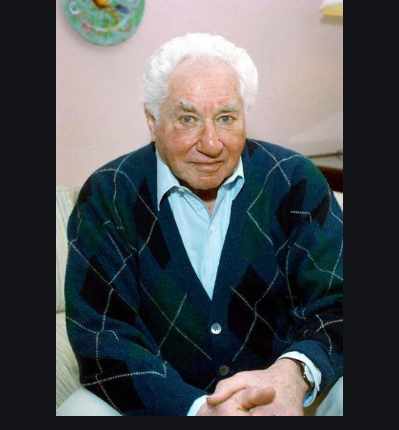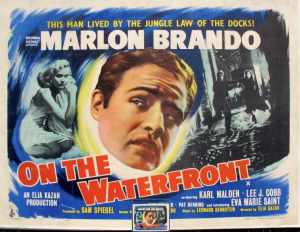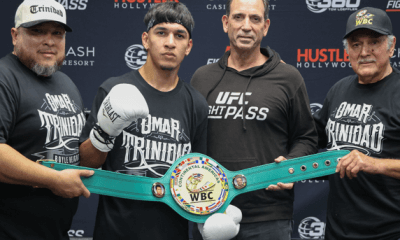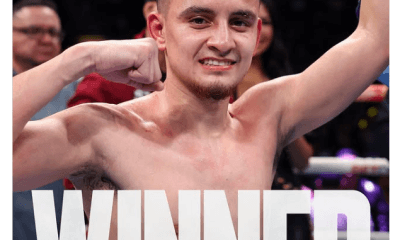Featured Articles
George Kimball Remembers Budd Schulberg: A TSS Classic

On this day in boxing history, Aug. 5, 2009, the great screenwriter, novelist, and essayist Budd Schulberg passed away at age 95. His passing inspired this tribute from his friend George Kimball, the longtime boxing writer for the Boston Herald who was then retired as a full-time newspaperman and writing extensively for this web site.
—
NEW YORK — I could tell from the choking sound on the other end of the line that the news wasn’t going to be good. It took him awhile, and when he finally got it out, the best his son could manage was “He’s gone…”
Budd Schulberg was 95 years old and had been in ill health for several months, so it was hardly unexpected, but the unsettling moment arrived late Wednesday afternoon when Benn phoned to tell me his father had passed away an hour earlier. Budd was a giant in our field, and a giant in many others as well. He was the only man ever to have both won an Oscar and been inducted into the International Boxing Hall of Fame, but he was also my dear friend of many years, and I miss him already.
* * *
Budd Schulberg was 15 years old in 1929 when he sailed to England with his father, the Hollywood mogul B.P. Schulberg. On that crossing the Schulbergs made the acquaintance of a fellow passenger on the Ile de France, a Georgia boxer named William Lawrence Stribling, who boxed under the nomme de guerre Young Stribling.
Upon learning that both Schulbergs were enthusiastic boxing fans, Stribling promised them a pair of ringside tickets for his upcoming bout at the Royal Albert Hall, where he was to fight an ungainly Italian giant named Primo Carnera.
If watching his father drop what he described as “a casually reckless wager” of 1,000 pounds when Carnera won by disqualification wasn’t enough to inspire a healthy skepticism in the younger Schulberg, the result of the return match certainly did. In what appeared to have been a pre-arranged scenario, Carnera and Stribling met again in Paris three weeks later, and this time Carnera returned the favor by getting himself disqualified in the seventh round. The episode made an indelible impression on Schulberg, who years later would base his cautionary boxing novel “The Harder They Fall” on the illusory rise and inglorious fall of Carnera, the heavyweight champion known as “The Ambling Alp.”
Now, think about this.
Eighty years later, this time by more modern contrivance, Budd returned to London again. This past February he flew over for the premier of “On the Waterfront,” a stage adaptation of his Academy Award-winning 1954 screenplay, at the Theatre Royal in Haymarket. Perhaps determined to reprise all facets of that 1929 rite of passage, he and his wife Betsy went from London to Paris, where they spent a week in the city that had hosted Stribling-Carnera II. They returned to London, where they attended yet another performance of On the Waterfront.
Afterward Budd repaired to a nearby pub with the cast of the London production, and spent the night celebrating with the cast. When he became ill on the flight back to New York the next day the initial assumption was that the partying was to blame, but what it really was was the onset of old age. This was particularly unsettling for Budd, because he was a month shy of his 95th birthday, and he had never before felt — or seemed — particularly old. Not to himself, not to any of us.
Benn Schulberg and I were at Madison Square Garden that night, at the Cotto-Jennings fight, when he got the phone call telling him that his dad had been taken off the plane at Kennedy Airport in a stretcher and rushed to the emergency room at Jamaica Hospital. Somewhere over the Atlantic his blood pressure had dropped alarmingly, and he barely had a pulse.
Budd improved enough over the next few days to be moved to Mt. Sinai in New York, where he could be under the care of his cardiologist, and eventually he was allowed to be home, but he remained in a weakened state. He had been in congestive heart failure for some time, and he had a chronic lung condition, the result of having sucked down some toxic fumes in a home kitchen fire several decades earlier, and then a couple of months ago he was well enough to undergo what was supposed to be routine surgery to repair a hernia. That’s when they found the cancer in his belly
There were several phone calls over the next few weeks while Budd and Betsy deliberated the various options, and since I’d had to make similar choices in the past, they consulted me on the matter. I’m not sure how helpful I was, other than to recommend an insistence on getting a full recitation of the potential benefits and consequences from whichever specialist had their ear at the moment, but in the end Budd opted for treatment. In June he came straight from a chemo appointment to attend the Boxing Writers dinner (where he received a standing ovation), and then just a few weeks ago he attended a staged reading of On the Waterfront in Hoboken. The event, by the New Artists Theatre, featured some cast members of “The Sopranos,” on the turf Schulberg’s play had immortalized, and the aura of corruption of the 50’s era had just been revived when the FBI took town a bunch of New Jersey mayors (and rabbis) a few days earlier.
“He probably shouldn’t have, but at the last minute he told me he wanted to go,” reported Benn. “He was in pretty bad shape, and I think everyone could tell that.”
“I certainly could,” said Lou di Bella, who was also in attendance that night. “I knew then that it was probably the last time I’d see him.”
* * *
I find myself thinking about the better times, and they weren’t so very long ago at that. Budd and Betsy had dinner with us at our place here in New York several times over the past few years, and when it finally became apparent that climbing the stairs of an old brownstone built before the age of elevators was a burden, we met for dinner in more nonogenarian-friendly locales. A year ago March we’d attended his 94th birthday party at an Upper West Side restaurant, along with his family and a few friends, including the artist LeRoy Neiman and the actress Patricia Neal, who’d starred in the film of Budd’s “A Face in the Crowd” half a century earlier.
Even though he could doubtless feel it closing in on him over those last few years he refused to make the normal concessions to age. A couple of years ago when we were in Vegas for the Mayweather-De La Hoya fight there was a late lunch with myself, Budd and Benn, and Michael Katz. We had to find a place with a television set so we could monitor the progress of the Kentucky Derby bets we’d placed at the sports book earlier in the day. During football season, especially come playoff time, and for a big fight we’d decided not to attend in person, we’d often gather at Benn’s apartment, order up obscene quantities of food and beer, and then try to stick one another with the tab through an intricate series of wagers, usually devised by Budd.
I’m 65, and at these gatherings I was often the second-youngest person in attendance. Budd didn’t hang out with many people his own age, mainly because people his own age were mostly dead. But any father will tell you he’d rather have no better friend than his own son, and Benn, who didn’t even come along until Budd was 67, was unquestionably Budd’s best friend, his constant companion at ringside.
* * *
I’d read Budd in my youth, long before I met him, beginning, as most do, with “What Makes Sammy Run,” without even understanding at the time the bedrock of personal experience underlying that book, or that its publication would, as his father had warned him it might, severely retard what had been a promising Hollywood career. It didn’t kill it altogether, of course. Budd was assigned to co-write a script with another member of the newly-fallen, F. Scott Fitzgerald, and while that project turned into a disaster, it did provide the basis for another splendid book based on the experience, “The Disenchanted.”
He straddled the worlds of literature and pugilism throughout his life, but unlike some of his more boastful contemporaries he was not a dilettante when it came to either. He sparred regularly with Mushy Callahan well beyond middle age. The night of the Frazier-Ali fight of the century Budd started to the arena in Muhammad Ali’s limousine, and then when the traffic got heavy, got out and walked to Madison Square Garden with Ali. A year before Jose Torres died, Budd and Betsy flew to Puerto Rico and spent several days with Jose and Ramona at their home in Ponce. Art Aragon was the best man at his wedding. And when push came to shove, he put on the gloves with both Ernest Hemingway and Norman Mailer and kicked both of their asses, though not, as some would now claim, on the same night.
* * *
Budd and I had sat together at another Boxing Writers Dinner at least a quarter century earlier. I remember being pretty full of myself, because I’d just come back from a fight in Vegas where I’d had a pretty good week at the tables as well. I’d not only won what seemed to me a ton of money but had spent enough time at the tables that Gene Kilroy had gotten the casino to comp my room — after they’d already issued me a receipt that would satisfy the bean counters at the newspaper.
As I was remarking on the delicious irony of it all, Budd punctured my reverie long enough to ask “Let me ask you this, George. Could you have afforded to lose $5,000?”
He knew I had two small children, and that of course I couldn’t. He then proceeded to tell me the cautionary tale of his own father, whose gambling Jones put his family at the brink of bankruptcy a couple of times. That night told me the story that would later appear in Moving Pictures, the biography of his early days in Hollywood, of the floating poker game that convened at the Schulberg manse just before young Budd was sent to his room to do his homework. When he came downstairs for breakfast eight hours later, his father was still at the table, where he was writing out a check for $20,000 to Chico Marx.
He was afflicted with a lifelong stammer that seemed to grow worse when he became excited or impatient, which wasn’t often. It has occurred to me more than once over the years that this probably evolved into an asset to his writing and his unerring ear for dialogue, because most conversations were so essentially one-sided that he became a very good listener.
* * *
In World War II he served in the OSS, and in the war’s aftermath was part of the prosecution team at the Nuremburg Trials, where his job was assembling photographic and film evidence for use against the Nazis on trial for war crimes.
He had been a Communist Party member in the late1930s, but had long since repudiated his ties after he had seen firsthand the evils of Stalinism. Although unlike many former CP members he retained a leftist stance on social and political issues throughout his life, he was tarred by his agreement to testify before the House Un-American Activities Committee in 1947. Many of his colleagues who refused were blacklisted, and lives were ruined. Budd was branded a pariah in some circles, but in his own mind his politics hadn’t wavered.
The episode did make him fair game on another front, particularly when On The Waterfront, directed by another former party member-turned-friendly witness, Elia Kazan, emerged in 1954. Kazan had earlier worked on another waterfront-themed project called “The Hook” with the playwright Arthur Miller. The biographer Jeffrey Meyers would later claim that “Miller had refused to turn the gangsters into communists, as the Columbia Pictures mogul Harry Cohn and the Hollywood union bosses wanted him to. The film was later written that way by Budd Schulberg (another self-serving friendly witness’) as On The Waterfront.”
As preposterous as the allegation seems — there are no more any bad-guy communists in On the Waterfront than there were in “A View from the Bridge,” the play Miller eventually wrote from “The Hook.” Moreover, Budd had purchased the rights to a New York Sun series about the Jersey docks as early as 1947, years before Miller’s brief flirtation with Kazan.
“When I was working on ‘On the Waterfront,’ I didn’t know about Arthur Miller,” Budd told an English newspaper in London back in February. “They were absolutely two separate, if overlapping, projects.”

Budd said at the time he resented the accusation “because it made me seem like I was trying to imitate Arthur Miller and walk in his footsteps. I didn’t like it.”
Miller died without the two men ever discussing the subject. This summer I was invited to read at a literary festival, the Listowel Writers Week in Ireland. Another of the invitees was the novelist and director Rebecca Miller, who in addition to being Daniel Day-Lewis’ wife is also Arthur Miller’s daughter. One morning at our hotel there I read her the offending passage from Meyers’ book.
“That’s absurd,” she said. “I’m sure my father never believed that. A View from the Bridge and On the Waterfont were always going to be two separate plays. One had nothing to do with the other.”
I know I told Benn about that conversation when I returned from Europe. But now it occurs to me that I never got a chance to tell Budd, who would have, I suspect, found it comforting.
* * *
Over the past few weeks Pete Hamill and I had spoken often of going out to Westhampton to visit Budd, but between our travel schedules and his medical issues the timing never seemed right. Benn was with him last weekend and reported that even then he was plainly struggling to breathe, in considerable discomfort. He seemed to sense that it was time to go, and as it turned out it was their final goodbye. When Benn got the news that his father had been taken to the hospital in Riverhead Wednesday afternoon he jumped straight into his car. By the time he got there Budd was already dead.
“But,” said his son as he choked back the tears, “he had a pretty good run, didn’t he?”
Yes, he did.
EDITOR’S NOTE: George Kimball died on July 6, 2011, after a six-year battle with esophageal cancer. In the last years of his life he was highly productive, authoring the widely acclaimed “Four Kings: Leonard, Hagler, Hearns, Duran, and the Last Great Era of Boxing,” and two boxing anthologies in collaboration with John Schulian.
Check out more boxing news on video at The Boxing Channel
To comment on this story in the Fight Forum CLICK HERE
-

 Featured Articles3 weeks ago
Featured Articles3 weeks agoThe Hauser Report: Zayas-Garcia, Pacquiao, Usyk, and the NYSAC
-

 Featured Articles2 weeks ago
Featured Articles2 weeks agoOscar Duarte and Regis Prograis Prevail on an Action-Packed Fight Card in Chicago
-

 Featured Articles1 week ago
Featured Articles1 week agoThe Hauser Report: Cinematic and Literary Notes
-

 Book Review4 days ago
Book Review4 days agoMark Kriegel’s New Book About Mike Tyson is a Must-Read
-

 Featured Articles4 weeks ago
Featured Articles4 weeks agoManny Pacquiao and Mario Barrios Fight to a Draw; Fundora stops Tim Tszyu
-

 Featured Articles4 weeks ago
Featured Articles4 weeks agoArne’s Almanac: Pacquiao-Barrios Redux
-

 Featured Articles3 weeks ago
Featured Articles3 weeks agoRemembering Dwight Muhammad Qawi (1953-2025) and his Triumphant Return to Prison
-

 Featured Articles4 weeks ago
Featured Articles4 weeks agoOleksandr Usyk Continues to Amaze; KOs Daniel Dubois in 5 One-Sided Rounds


















